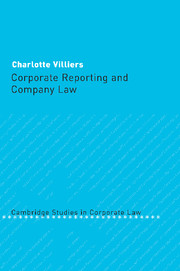Book contents
- Frontmatter
- Contents
- Preface
- Table of legislation
- Table of cases
- Introduction
- PART I GENERAL ISSUES
- 1 Disclosure theory and the limitations of corporate reports
- 2 The regulatory framework
- 3 Persons responsible for presenting corporate reports and information
- 4 Users of corporate reports
- 5 The Companies Register
- PART II FINANCIAL REPORTING
- PART III NARRATIVE REPORTING
- PART IV A WAY FORWARD
- Bibliography
- Index
2 - The regulatory framework
Published online by Cambridge University Press: 23 July 2009
- Frontmatter
- Contents
- Preface
- Table of legislation
- Table of cases
- Introduction
- PART I GENERAL ISSUES
- 1 Disclosure theory and the limitations of corporate reports
- 2 The regulatory framework
- 3 Persons responsible for presenting corporate reports and information
- 4 Users of corporate reports
- 5 The Companies Register
- PART II FINANCIAL REPORTING
- PART III NARRATIVE REPORTING
- PART IV A WAY FORWARD
- Bibliography
- Index
Summary
Introduction
The structure of the regulatory framework for corporate reporting and dialogue strongly influences the character and development of the disclosure regime. Effective disclosure depends in the first place on knowledge and understanding of the reporting obligations both by those required to provide and prepare the information and by those entitled to receive such information. The existence of a clear and transparent regulatory framework contributes to that knowledge. A balance between standardisation and accommodation of specific company needs is also required. Standardisation aids discipline in reporting and allows for comparability and credibility. At the same time, different companies have their own needs and one aspect of the reporting regime is to recognise and accommodate the individual needs of companies and information users. The major objectives of disclosure, as was observed in chapter 1, are to enable companies to take stock of their position financially and in the market place, as well as to encourage more informed and better quality decision-making and finally to improve corporate behaviour and behaviour of those acting within the company or to maintain best practice. Information, followed by effective dialogue and decision-making, is a stepping-stone to those objectives. To what extent does the regulatory disclosure regime enable the objectives to be achieved in the UK?
The UK's disclosure regime is multi-layered and has input from a variety of institutions internationally as well as nationally.
- Type
- Chapter
- Information
- Corporate Reporting and Company Law , pp. 37 - 52Publisher: Cambridge University PressPrint publication year: 2006

